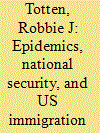| Srl | Item |
| 1 |
ID:
140558


|
|
|
|
|
| Summary/Abstract |
What are relationships between epidemics, national security, and US immigration policy? This question is important because it sheds light on transnational or nontraditional security areas, American immigration policy, and a pressing issue for US leaders who have recently faced epidemics such as the West Africa Ebola outbreak that began in 2013. This article answers it and lays ground in the area by reviewing epidemics in world history, using International Relations and Security Studies works to specify dangers of contagions for states, and identifying three general immigration measures that American leaders have utilized from the seventeenth century to the present day to protect against contagions, which are (1) policies restricting entrance of foreigners thought to carry specified diseases, (2) the isolation or quarantining of immigrants with contagious disease, and (3) delegating the President with authority to stop immigration in the event of an epidemic abroad. This study has implications for research and contemporary US immigration policy.
|
|
|
|
|
|
|
|
|
|
|
|
|
|
|
|
| 2 |
ID:
121161


|
|
|
|
|
| Publication |
2012.
|
| Summary/Abstract |
The making of the Constitution was an international event consisting of envoys from the thirteen states seeking to devise a solution to two diplomatic and security crises, that amongst the units (states and regions) of the Confederation with one another and with foreign powers. Early America is often structured as a fixed "nation" in studies of the period, but it is perhaps more accurate to classify it as comprising a state-system, one which was part of a larger international system. This article reviews how this dynamic and the role of diplomacy factored into constitutional reform in the 1780s by surveying the extant scholarship in the area and through analyzing debate at the Federal Convention and the reaction of the founders to the threat of internecine and foreign war during the Confederation. It concludes by discussing how its findings point to new lines of inquiry into the early American political experience.
|
|
|
|
|
|
|
|
|
|
|
|
|
|
|
|
| 3 |
ID:
154117


|
|
|
|
|
| Summary/Abstract |
How has the United States used migration as part of its statecraft and foreign policy? This question is significant because migration is an important contemporary transnational policy area for the United States; and because a state’s foreign-immigration policy nexus remains an under-explored vantage point for examining diplomatic and international history. This review article answers the question and lays conceptual and empirical ground in the area by examining the historical record and extant research to show that American leaders from the country’s founding through the early twenty-first century have used migration as an instrument of statecraft by primarily attempting to reach three foreign policy objectives: pleasing, harming, and bargaining with states. For each of these categories, the analysis explicates relationships between statecraft and migration for the United States, identifies policy instruments used by American leaders to influence migration for diplomatic and foreign policy objectives, and presents historical cases of American migration policies designed for foreign policy goals. The conclusion provides the research and policy implications of its findings.
|
|
|
|
|
|
|
|
|
|
|
|
|
|
|
|